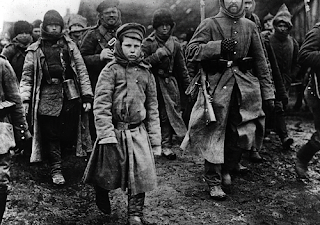Foreshadowing
fore·shad·ow
fôrˈSHadō
verb
gerund or present participle: foreshadowing
be a warning or indication of (a future event).
I watched the The Game of Thrones television series based on George R. R. Martin's Songs of Fire and Ice for the second time and noticed the saga was peppered with foreshadowing. Throughout the series subtle phrases gave the viewer a glimpse into the coming events. For example, several times early in the saga the ill-fated character Catelyn alluded to never seeing her children again, and another occured following the marriage of Rob Stack to Jayne Westerling when one of Rob's bannermen prophesied, "Your marriage cost us the war."
 |
| Catelyn Stark |
The Storm
Since Akulina's death was the focal point of all of my novels, it was mentioned in all three. Most, if not all, my foreshadowing came from Akulina's visions. Her reputation as a seer provided a seamless way to present future events. In my first novel, Ikons: Saint Nicholas the Wonder Worker, soon after Massey leaves for America, Akulina tells her father of a vision very similar to that of Catlyn Stark.
* * *
Akulina continued to stare off at the distant horizon,
watching something hidden from her father's eyes. "No. Not exactly a
vision," she explained in a tone devoid of emotion. “I feel it more than I see it. Even now when I look to the sky I can feel
it and almost make it out. It’s like a
black cloud that fills the entire sky just beneath the horizon. But it’s much more than a cloud. It’s much more than a storm. It’s blackness. A blackness darker than the darkness in potato cellar beneath the
izbah. A blackness.”
Akulina looked at the ground before her. "I have a feeling--a very strong feeling that I will never see my Massey again. I can't explain it, Papa. I just know it."
* * *
 |
| Akulina's Vision |
The Onion Field
My second novel, Banners: For God, Tsar, and Russia, began with foreshadowing. Shortly before the outbreak of the Great War, Akulina collapsed while harvesting the onion field. When questioned why she cried out the Russian word for skulls, she admitted the bulbs appeared as the skulls of people she knew. She then added, “The last skull I saw, was mine.” |
| Akulina's vision |
Making Cheese
I kept the skull image in the final novel, Slogans: Our Children, Our Future. This time I used the scene where Akulina was making cheese. As she stirred the mixture, cheese globules began to form and morphed into the shape of skulls. (I must like the skull image since I employed it twice.) Again, Akulina recognized the features as those deceased. This time they called out to her.
* * *
In turn, Master Gleb, Ultia Yauhoraka, Simon Petr and Kochek
the Cobbler broke to the surface and sank.
Finally, as one, the skulls churned to the top, stared at her from empty
sockets and cried out through lipless mouths.
“Akulina Boriskova, soon you will join us.” The onion field had returned and once more Akulina crumpled.
* * *
Looking back at my use of foreshadowing, I don't think they were very subtle. They may have taken the reader out of the flow and bludgeoned him with images, but Akulina's death merited strong ones. While foreshadowing is obviously important with writing a saga, use them sparingly and treat them with care. Reread your favorite novel and watch for well constructed examples.
































